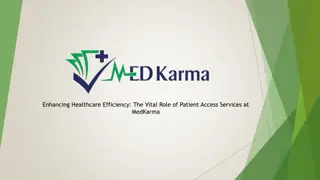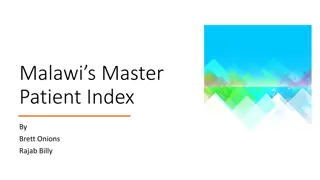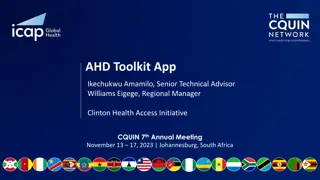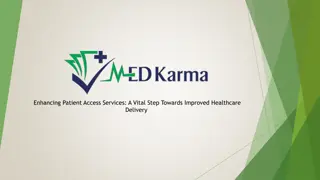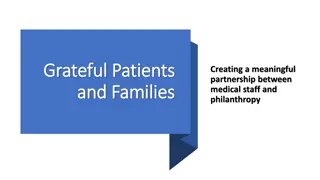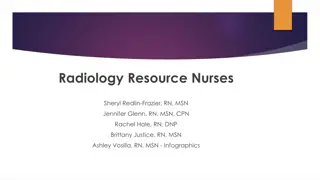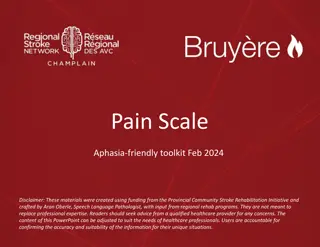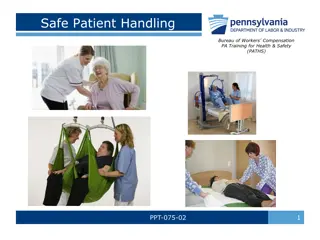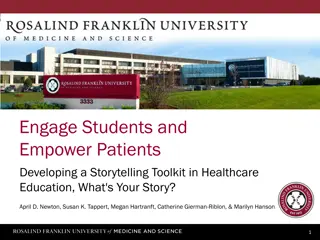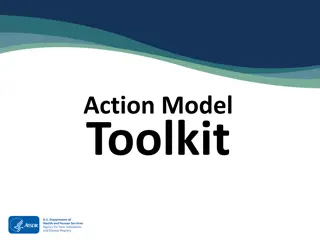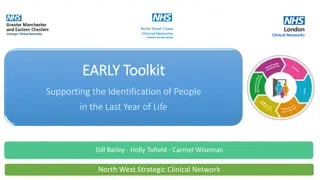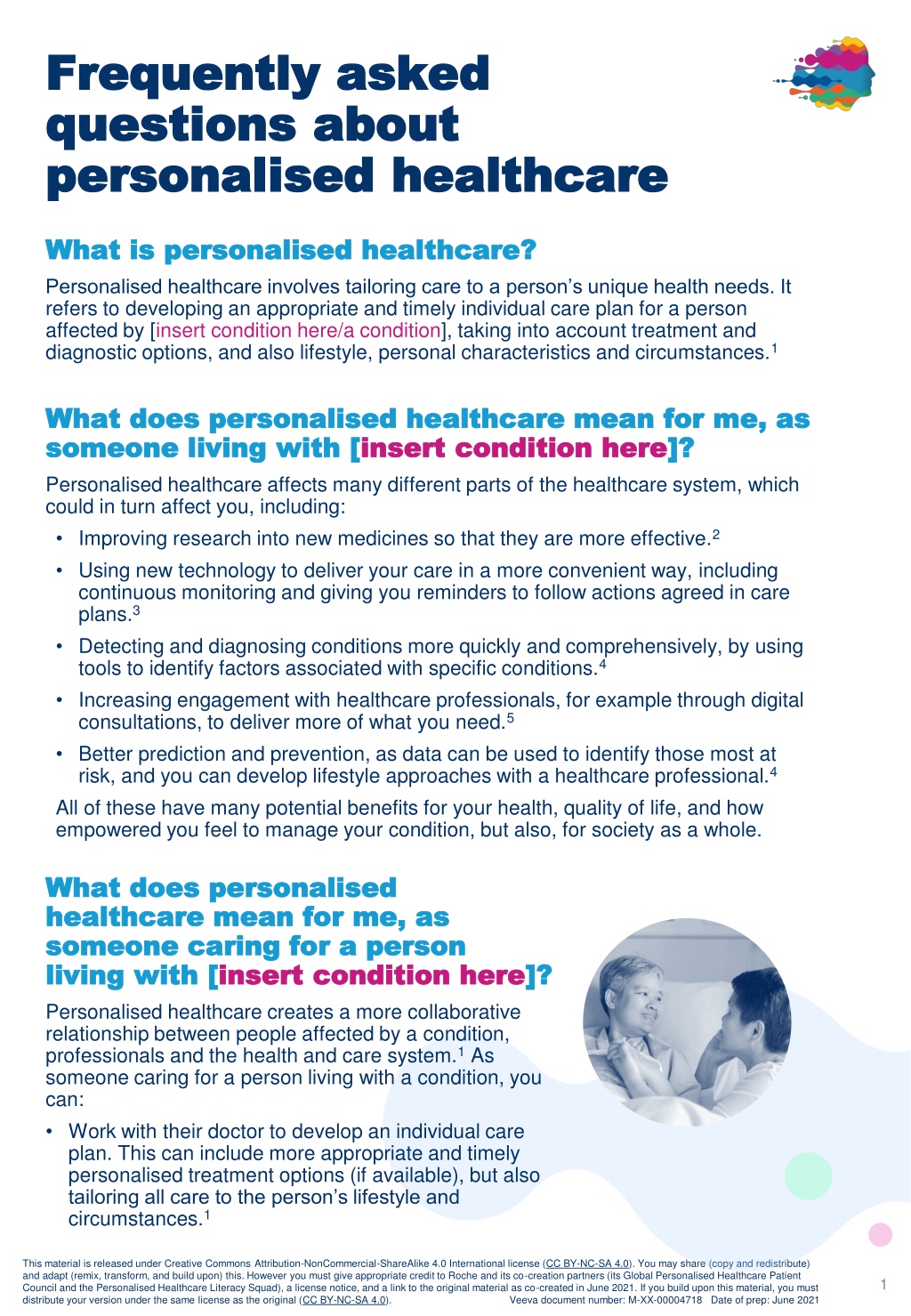
Understanding Personalised Healthcare
Personalised healthcare involves tailoring care to an individual's unique health needs, taking into account treatment options, lifestyle factors, and personal circumstances. Explore its benefits and implications for both patients and caregivers.
Uploaded on | 0 Views
Download Presentation

Please find below an Image/Link to download the presentation.
The content on the website is provided AS IS for your information and personal use only. It may not be sold, licensed, or shared on other websites without obtaining consent from the author. If you encounter any issues during the download, it is possible that the publisher has removed the file from their server.
You are allowed to download the files provided on this website for personal or commercial use, subject to the condition that they are used lawfully. All files are the property of their respective owners.
The content on the website is provided AS IS for your information and personal use only. It may not be sold, licensed, or shared on other websites without obtaining consent from the author.
E N D
Presentation Transcript
Frequently asked Frequently asked questions about questions about personalised healthcare personalised healthcare What is personalised healthcare? What is personalised healthcare? Personalised healthcare involves tailoring care to a person s unique health needs. It refers to developing an appropriate and timely individual care plan for a person affected by [insert condition here/a condition], taking into account treatment and diagnostic options, and also lifestyle, personal characteristics and circumstances.1 What does personalised healthcare mean for me, as What does personalised healthcare mean for me, as someone living with [ someone living with [insert condition here insert condition here]? Personalised healthcare affects many different parts of the healthcare system, which could in turn affect you, including: Improving research into new medicines so that they are more effective.2 Using new technology to deliver your care in a more convenient way, including continuous monitoring and giving you reminders to follow actions agreed in care plans.3 Detecting and diagnosing conditions more quickly and comprehensively, by using tools to identify factors associated with specific conditions.4 Increasing engagement with healthcare professionals, for example through digital consultations, to deliver more of what you need.5 Better prediction and prevention, as data can be used to identify those most at risk, and you can develop lifestyle approaches with a healthcare professional.4 All of these have many potential benefits for your health, quality of life, and how empowered you feel to manage your condition, but also, for society as a whole. ]? What does personalised What does personalised healthcare mean for me, as healthcare mean for me, as someone caring for a person someone caring for a person living with [ living with [insert condition here insert condition here]? Personalised healthcare creates a more collaborative relationship between people affected by a condition, professionals and the health and care system.1As someone caring for a person living with a condition, you can: Work with their doctor to develop an individual care plan. This can include more appropriate and timely personalised treatment options (if available), but also tailoring all care to the person s lifestyle and circumstances.1 ]? CC BY-NC-SA 4.0 This material is released under Creative Commons Attribution-NonCommercial-ShareAlike 4.0 International license (CC BY-NC-SA 4.0). You may share (copy and redistribute) and adapt (remix, transform, and build upon) this. However you must give appropriate credit to Roche and its co-creation partners (its Global Personalised Healthcare Patient Council and the Personalised Healthcare Literacy Squad), a license notice, and a link to the original material as co-created in June 2021. If you build upon this material, you must distribute your version under the same license as the original (CC BY-NC-SA 4.0). 1 CC BY-NC-SA 4.0 Veeva document number: M-XX-00004718 Date of prep: June 2021
FAQs about personalised FAQs about personalised healthcare healthcare Use new technologies (if available) to help monitor their condition and deliver care in a more convenient way.3 Share your experience and perspective to improve care not just for people living with a condition, but for those who care for them too. What should I ask my doctor about personalised What should I ask my doctor about personalised healthcare? healthcare? Personalised healthcare is evolving all the time, across different geographies and health conditions. If you want to explore personalised healthcare for yourself, or someone you care for, a good place to start is the status of personalised healthcare in relation to yours or their personal circumstances. For example, whether personalised healthcare is a viable option for the condition. Here are some initial questions you may find helpful to ask your doctor: Is there any genomic testing available for this diagnosis? Are there any targeted treatments available for this condition? Are there any new clinical trials that offer a more targeted treatment for this condition? Are there any apps or other digital tools that can better monitor the progression of the condition? You can find a glossary of definitions related to personalised healthcare here What is the difference between personalised What is the difference between personalised medicine and personalised healthcare? medicine and personalised healthcare? Personalised medicine refers to a treatment approach that uses genomics to understand a person s condition, and treat them specifically.4,6Personalised healthcare is broader than just treatment. It provides care by first and foremost looking at the person, their lifestyle and their circumstances, and finding the most effective way to care for them.1 It provides more sustainable diagnostic support and appropriate and timely treatment approaches through an individual healthcare plan.7 CC BY-NC-SA 4.0 This material is released under Creative Commons Attribution-NonCommercial-ShareAlike 4.0 International license (CC BY-NC-SA 4.0). You may share (copy and redistribute) and adapt (remix, transform, and build upon) this. However you must give appropriate credit to Roche and its co-creation partners (its Global Personalised Healthcare Patient Council and the Personalised Healthcare Literacy Squad), a license notice, and a link to the original material as co-created in June 2021. If you build upon this material, you must distribute your version under the same license as the original (CC BY-NC-SA 4.0). 2 CC BY-NC-SA 4.0 Veeva document number: M-XX-00004718 Date of prep: June 2021
FAQs about personalised FAQs about personalised healthcare healthcare How can personalised healthcare help people with How can personalised healthcare help people with conditions where there are currently no treatment conditions where there are currently no treatment options, for example in their daily life at home? options, for example in their daily life at home? Advances in technology can improve the day-to-day management of a condition, for example by giving reminders to take medicines or log symptoms. It also allows people to speak to their healthcare professionals and access their health records securely from their own homes.3,8 This can help people to better understand their condition, give them more of a say in their care plans, and find habits that have the potential to improve their quality of life. Personalised healthcare and improved monitoring can provide information that helps research and, as a result, helps to advance the search for new treatments, leading to better care decisions.2,5 FAQs about the future of FAQs about the future of personalised healthcare personalised healthcare When will personalised healthcare become a When will personalised healthcare become a reality? reality? Personalised healthcare is already a reality in many ways, with advancements happening every day. These developments can be seen with the availability of more targeted treatments, such as precision medicines; diagnostic tests, such as comprehensive genomic profiling, also known as biomarker testing; and imaging, such as visualising progression of a condition and how treatments are working.4 However, there is still a long way to go before it becomes routine for every person living with a condition to be treated individually with a unique health profile that results in a personalised healthcare plan. Will personalised healthcare Will personalised healthcare replace healthcare systems replace healthcare systems as we know them? as we know them? Personalised healthcare has the potential to fundamentally change the way current healthcare systems operate, lowering the cost of healthcare and making each step in a person s treatment more efficient. It has the potential to transform healthcare systems towards paying for healthcare that provides the outcomes that mean the most to people affected by conditions.7,9 CC BY-NC-SA 4.0 This material is released under Creative Commons Attribution-NonCommercial-ShareAlike 4.0 International license (CC BY-NC-SA 4.0). You may share (copy and redistribute) and adapt (remix, transform, and build upon) this. However you must give appropriate credit to Roche and its co-creation partners (its Global Personalised Healthcare Patient Council and the Personalised Healthcare Literacy Squad), a license notice, and a link to the original material as co-created in June 2021. If you build upon this material, you must distribute your version under the same license as the original (CC BY-NC-SA 4.0). 3 CC BY-NC-SA 4.0 Veeva document number: M-XX-00004718 Date of prep: June 2021
FAQs about the future of FAQs about the future of personalised healthcare personalised healthcare How will personalised healthcare help to improve How will personalised healthcare help to improve treatment? treatment? Personalised healthcare puts the person living with a condition at the centre of the process, instead of the condition. It looks at lots of factors such as demographics, general health, unique genomics and individual needs to find the best care for that person. Taking all of these factors into account means that a timely and appropriate care plan is matched to each person individually, which has the potential to improve their outcomes.1,4 Another big focus of personalised healthcare is to engage more with people affected by conditions and patient organisations when developing new medicines. They are consulted during clinical trial planning to ensure research is focused on developing new treatments that meaningfully help the people who need them.2,10 How will personalised healthcare help to improve How will personalised healthcare help to improve diagnosis of conditions? diagnosis of conditions? Personalised healthcare involves advances in technology, such as imaging techniques, which can find out more about a condition and what is going on inside the body, and other diagnostic tools, such as genomic profiling (or biomarker testing), which can reveal more about the factors based on our genes influencing the condition.3,4 Using these new technologies, there is potential for conditions to be detected earlier and/or prevented, and physicians can make more informed care decisions and provide personalised treatment plans.4 How will personalised healthcare help to improve How will personalised healthcare help to improve prediction and prevention of conditions? prediction and prevention of conditions? A big part of moving towards personalised healthcare solutions focuses on early detection, screening and follow-up to predict and prevent conditions: With the consent of the people sharing it, data can be used to identify those most at risk of a condition so that suitable lifestyle changes can be agreed between the person affected and their healthcare professional.1,3 Recognising early symptoms means people can communicate these to a healthcare professional and access healthcare early on.11 By tackling individual risks early on, people can continue life with minimal disruption and potentially limited long-term consequences.11,12 This has the potential to move society as a whole from treating conditions to caring for the individual as a whole and taking into account their specific needs. CC BY-NC-SA 4.0 This material is released under Creative Commons Attribution-NonCommercial-ShareAlike 4.0 International license (CC BY-NC-SA 4.0). You may share (copy and redistribute) and adapt (remix, transform, and build upon) this. However you must give appropriate credit to Roche and its co-creation partners (its Global Personalised Healthcare Patient Council and the Personalised Healthcare Literacy Squad), a license notice, and a link to the original material as co-created in June 2021. If you build upon this material, you must distribute your version under the same license as the original (CC BY-NC-SA 4.0). 4 CC BY-NC-SA 4.0 Veeva document number: M-XX-00004718 Date of prep: June 2021
FAQs about data and new FAQs about data and new technologies in personalised technologies in personalised healthcare healthcare Why are people asked to share their data to inform Why are people asked to share their data to inform personalised healthcare? personalised healthcare? By consenting to sharing their data and insights on management of their condition, people can contribute to broader knowledge and understanding of a specific condition.13 Information that could identify individuals will be removed from data sets, so that the people whom the data describe remain anonymous. Artificial intelligence, telemedicine (e.g. telephone consultations) and digital health apps, as well as other tools that can gather data, with consent of the individual, have the potential to make healthcare more tailored. They can increase interactions with healthcare professionals, and help with tracking or monitoring a condition on an ongoing basis. This can in turn lead to more personalised decision-making, that has a positive effect on people s lives.5,13,14 Bigger and more robust data systems, such as electronic health registries, containing individuals health data, can measure the impact of healthcare and monitor a person s health status including compared to others affected by the same condition. They can also generate wide-scale data that contribute to improving overall understanding of a condition, and benchmark progress made.8,13 How will sharing data benefit me and others living How will sharing data benefit me and others living with [ with [insert condition here insert condition here]? Monitoring your condition and sharing data can allow you to engage more with your healthcare professional, working together to tailor a care plan that is specific to you and your needs. Long-term, data sharing can help researchers learn more about specific conditions, and develop more targeted treatments or methods for you to manage your condition in day-to-day life.13 ]? Where are these data kept? Will they be safe? Where are these data kept? Will they be safe? When agreeing to provide data to a third party, consent should always be asked for in writing, with detail about how data will be kept and their primary use. The third party should confirm what data will be collected, whether it will be anonymised, who will have access to the data, and the protocol for removing data from their records. Data collected for research, for example, may be used for more than one research project, but the details of this may not be specified. Is it legal for companies to collect data to inform Is it legal for companies to collect data to inform personalised healthcare without consent? personalised healthcare without consent? No, personal data cannot be collected and used without the person s consent. There are strict guidelines in place, such as the EU General Data Protection Regulation (GDPR), which ensure any data collected and used by an organisation is only done so with the person s consent. CC BY-NC-SA 4.0 This material is released under Creative Commons Attribution-NonCommercial-ShareAlike 4.0 International license (CC BY-NC-SA 4.0). You may share (copy and redistribute) and adapt (remix, transform, and build upon) this. However you must give appropriate credit to Roche and its co-creation partners (its Global Personalised Healthcare Patient Council and the Personalised Healthcare Literacy Squad), a license notice, and a link to the original material as co-created in June 2021. If you build upon this material, you must distribute your version under the same license as the original (CC BY-NC-SA 4.0). 5 CC BY-NC-SA 4.0 Veeva document number: M-XX-00004718 Date of prep: June 2021
FAQs about data and new FAQs about data and new technologies in personalised technologies in personalised healthcare healthcare How are genomic tests done? Will we have to get our How are genomic tests done? Will we have to get our own tests done? own tests done? Genomic testing is a key part of personalised healthcare for many conditions and can help to develop a personalised healthcare plan. Genomic testing involves looking at someone s DNA: the chemical database that carries instructions for our body s functions. DNA is typically collected from saliva, either by spitting into a tube or swabbing the inside of your cheek.15 It will usually be done as part of a genomic consultation with a doctor. A medically trained professional will order and do the test. If you are interested in genomic testing, you should speak to your healthcare provider and insurer (if appropriate) for more information about your options. FAQs about getting involved FAQs about getting involved How do I find a clinical trial that is looking into How do I find a clinical trial that is looking into more personalised treatment and approaches? more personalised treatment and approaches? The availability and frequency of clinical trials varies across geographies and conditions. If you or a person you care for is interested in participating in a clinical trial, then the best approach is to speak to your healthcare team or local patient organisation [personalise as applicable] to gain more insight into any relevant trials that may be recruiting. How can I get involved in advancing personalised How can I get involved in advancing personalised healthcare? healthcare? The easiest way to help advance personalised healthcare is to spread the word. There are still so many people living with conditions that are not aware of all of the options available to them in making their care more tailored. By educating other people about personalised healthcare, you can empower someone to ask for care for themselves and their loved ones. CC BY-NC-SA 4.0 This material is released under Creative Commons Attribution-NonCommercial-ShareAlike 4.0 International license (CC BY-NC-SA 4.0). You may share (copy and redistribute) and adapt (remix, transform, and build upon) this. However you must give appropriate credit to Roche and its co-creation partners (its Global Personalised Healthcare Patient Council and the Personalised Healthcare Literacy Squad), a license notice, and a link to the original material as co-created in June 2021. If you build upon this material, you must distribute your version under the same license as the original (CC BY-NC-SA 4.0). 6 6 CC BY-NC-SA 4.0 Veeva document number: M-XX-00004718 Date of prep: June 2021
References References 1. Duke Center for Personalized Healthcare. [Internet; cited 2021 May]. Available from: https://dukepersonalizedhealth.org/personalized-health-care/ Garralda E, Dienstmann R, Piris-Gim nez A, Bra a I, Rodon J, Tabernero J. New clinical trial designs in the era of precision medicine. Mol Oncol. 2019;13(3):549-557. doi:10.1002/1878- 0261.12465 Tcheng, J. E., et al. Optimizing Strategies for Clinical Decision Support: Summary of a Meeting Series. 2017. Washington, DC: National Academy of Medicine. European Biopharmaceutical Enterprises and the European Federation of Pharmaceutical Industries and Associations Final Report (2018) The benefits of personalised medicine to patients, society and healthcare systems [Internet; cited 2020 October] Available from: https://www.ebe-biopharma.eu/wp- content/uploads/2018/07/CRA-EBE-EFPIA-Benefits-of-PM-Final-Report-6-July-2018-STC.pdf National Health Service The Topol Review (2019) Preparing the healthcare workforce to deliver the digital future [Internet; accessed 2021 May] Available from: https://topol.hee.nhs.uk/ England National Health Service. [Internet; cited 2020 October]. Available from: https://www.england.nhs.uk/healthcare-science/personalisedmedicine/ European Biopharmaceutical Enterprises and the European Federation of Pharmaceutical Industries and Associations (2019) Value-based healthcare an industry perspective [Internet; cited 2021 May] Available from: https://www.efpia.eu/media/412971/value-based-healthcare-an-industry- perspective.pdf HealthIT [Internet; cited 2021 May] Available from: https://www.healthit.gov/faq/what-are- advantages-electronic-health-records Washington Health Alliance press release (2018) New Study Finds Hundreds of Thousands of Washington Patients Receive Unnecessary Tests, Procedures, and Treatments [Internet; cited 2021 May] Available from: https://wahealthalliance.org/new-study-finds-hundreds-of-thousands-of- washington-patients-receive-unnecessary-tests-procedures-and-treatments/ 10. Van der Scheer L et al. The benefits of patient involvement for translational research. Health Care Anal. 2014 2017 Sep;25(3):225-241. doi: 10.1007/s10728-014-0289-0 11. England National Health Service. [Internet; cited 2021 May]. Available from: https://www.england.nhs.uk/cancer/early-diagnosis/ 12. Healthy People Clinical Preventative Services [Internet; cited 2021 May] Available from: https://www.healthypeople.gov/2020/leading-health-indicators/2020-lhi-topics/Clinical-Preventive- Services 13. Seyhan, A.A., Carini, C. Are innovation and new technologies in precision medicine paving a new era in patients centric care?. J Transl Med 17, 114 (2019). 14. Roche How personalised healthcare can change lives [Internet; accessed 2021 May] Available from: https://www.youtube.com/watch?v=QqC_Q3KlvpM&list=PLmXzuVn0p6GBR9Ifys1c8b9JFrk1q45au &index=6 15. National Comprehensive Cancer Network; Biomarker Testing; [Internet; cited 2021 May] Available from: https://www.nccn.org/patients/resources/life_with_cancer/treatment/biomarker_testing.aspx 2. 3. 4. 5. 6. 7. 8. 9. CC BY-NC-SA 4.0 This material is released under Creative Commons Attribution-NonCommercial-ShareAlike 4.0 International license (CC BY-NC-SA 4.0). You may share (copy and redistribute) and adapt (remix, transform, and build upon) this. However you must give appropriate credit to Roche and its co-creation partners (its Global Personalised Healthcare Patient Council and the Personalised Healthcare Literacy Squad), a license notice, and a link to the original material as co-created in June 2021. If you build upon this material, you must distribute your version under the same license as the original (CC BY-NC-SA 4.0). 7 CC BY-NC-SA 4.0 Veeva document number: M-XX-00004718 Date of prep: June 2021



